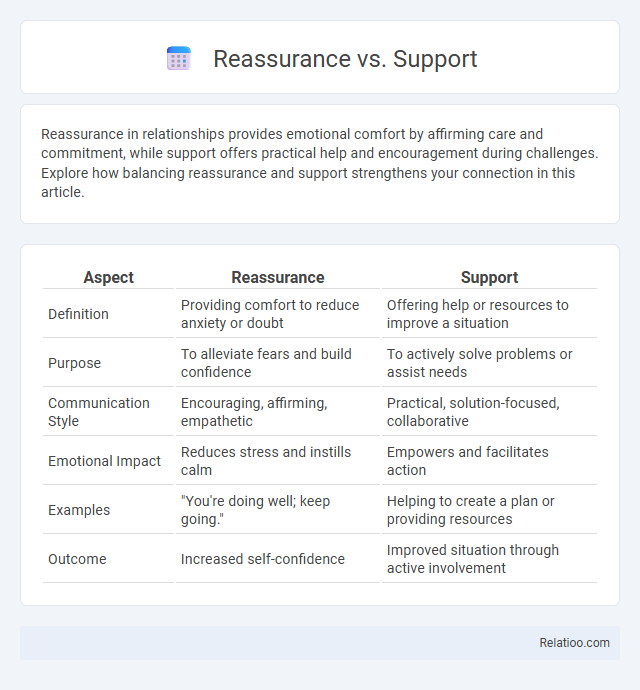Reassurance in relationships provides emotional comfort by affirming care and commitment, while support offers practical help and encouragement during challenges. Explore how balancing reassurance and support strengthens your connection in this article.
Table of Comparison
| Aspect | Reassurance | Support |
|---|---|---|
| Definition | Providing comfort to reduce anxiety or doubt | Offering help or resources to improve a situation |
| Purpose | To alleviate fears and build confidence | To actively solve problems or assist needs |
| Communication Style | Encouraging, affirming, empathetic | Practical, solution-focused, collaborative |
| Emotional Impact | Reduces stress and instills calm | Empowers and facilitates action |
| Examples | "You're doing well; keep going." | Helping to create a plan or providing resources |
| Outcome | Increased self-confidence | Improved situation through active involvement |
Understanding Reassurance and Support
Understanding reassurance involves providing comfort and reducing anxiety by affirming someone's feelings or situation, which helps stabilize their emotional state. Support focuses on tangible actions or resources that assist you in overcoming challenges or achieving goals, such as offering advice, physical help, or emotional encouragement. Both reassurance and support are essential in fostering resilience and promoting well-being during difficult times.
Key Differences Between Reassurance and Support
Reassurance involves providing comfort and reducing anxiety by affirming safety or correctness, while support encompasses offering practical help, guidance, or resources to address challenges. Reassurance targets emotional relief, focusing on alleviating fears or doubts, whereas support emphasizes tangible assistance and problem-solving. Understanding these distinctions helps tailor interventions effectively in contexts such as counseling, healthcare, and interpersonal relationships.
The Psychology Behind Seeking Reassurance
Seeking reassurance involves a psychological need to alleviate anxiety by confirming that one's fears or doubts are unfounded, distinct from seeking support, which focuses on receiving help or encouragement during challenges. Your mind craves reassurance to reduce uncertainty and promote emotional stability, often through repetitive questions or validation from others. Understanding this difference allows you to identify when reassurance is a temporary comfort versus when deeper support or intervention is necessary for long-term mental wellness.
The Role of Genuine Support in Emotional Well-being
Genuine support plays a crucial role in emotional well-being by providing consistent empathy, active listening, and validation of feelings, which fosters trust and reduces feelings of isolation. Unlike reassurance, which often aims to alleviate immediate anxiety through comforting words, genuine support encourages long-term resilience and personal growth by empowering individuals to navigate their emotions constructively. Empirical studies indicate that sustained emotional support correlates with lower stress levels, improved mood stability, and enhanced overall mental health outcomes.
Common Misconceptions About Reassurance and Support
Common misconceptions about reassurance and support often confuse reassurance with enabling, mistakenly believing that offering reassurance undermines personal responsibility. Support involves active assistance and problem-solving, but many perceive it solely as emotional comfort, overlooking its role in empowerment. Understanding these distinctions clarifies that reassurance alleviates anxiety, while support fosters growth and resilience.
When Does Reassurance Become Unhealthy?
Reassurance becomes unhealthy when it fosters dependency and prevents you from developing coping skills or addressing underlying issues independently. Excessive reassurance-seeking can undermine trust and self-confidence, leading to increased anxiety rather than alleviating it. Support provides constructive assistance by empowering growth, while reassurance without boundaries risks creating a cycle of reliance and emotional vulnerability.
How Effective Support Promotes Personal Growth
Effective support fosters personal growth by providing consistent encouragement and practical resources that empower you to overcome challenges and build resilience. Unlike mere reassurance, which temporarily alleviates doubts, genuine support cultivates skills and confidence through active involvement and tailored guidance. This dynamic approach enhances your self-efficacy and promotes long-term development.
Practical Ways to Offer Support, Not Just Reassurance
Offering practical support involves actively helping someone with tangible actions such as assisting with tasks, providing resources, or sharing useful information, rather than solely offering verbal reassurance. Unlike reassurance that focuses on alleviating fears through comforting words, practical support directly addresses the root of challenges, fostering empowerment and problem-solving. Effective support combines empathy with actionable steps, enhancing resilience and promoting meaningful progress in difficult situations.
The Impact of Reassurance vs Support in Relationships
Reassurance in relationships helps reduce anxiety by affirming trust and commitment, providing emotional security during moments of doubt. Support, on the other hand, involves active assistance and problem-solving that strengthens the partnership through tangible help and encouragement. Studies show that while reassurance addresses emotional needs directly, consistent support fosters resilience and long-term relational stability by promoting cooperative interactions.
Choosing Support Over Reassurance for Long-Term Benefits
Choosing support over reassurance fosters long-term resilience by encouraging problem-solving and emotional growth, unlike reassurance, which often provides temporary comfort but can create dependency. Support promotes active listening, validation, and collaborative solutions that empower individuals to develop coping skills and confidence. Research highlights that sustained support improves mental health outcomes by building autonomy and reducing anxiety more effectively than repeated reassurance.

Infographic: Reassurance vs Support
 relatioo.com
relatioo.com